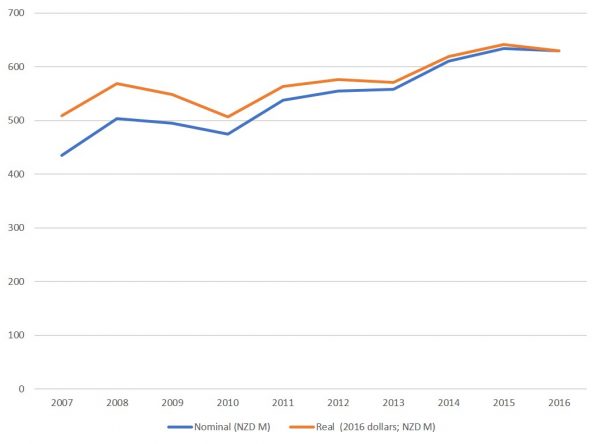On Monday (1 May), Murray McCully will step down as New Zealand’s foreign minister, to be replaced by Gerry Brownlee. Brownlee is a long serving politician, but it will be his first stint in foreign affairs and he has no aid experience.
Although Minister McCully presided over a first order scandal in the form of the Saudi Sheep deal, he did (working with many others) manage to get New Zealand onto the UN Security Council. This feat has dominated New Zealand media coverage of his time as foreign minister. Coverage of McCully’s aid legacy, on the other hand, has been superficial.
So, as a public service, I’ve tried to explain exactly what this aid legacy was.
I’ve done so with this blog post, which carefully charts the changes to NZ’s aid focus that McCully brought. And in this post (for the New Zealand foreign affairs blog Incline) I’ve looked his broader impact on aid, and the lessons for the rest of us from the McCully era.
As an additional service, here are two more charts.
First, absolute and nominal New Zealand aid levels. Under McCully’s tenure, in inflation adjusted terms, New Zealand aid increased by about 11 per cent. This isn’t great. But compared to Australia (about an 18 per cent fall across the same period) it looks reasonable. (Data are OECD data and in calendar years, the first year’s spending from a National Party budget was 2009.)
Nominal and inflation adjusted ODA levels – New Zealand
(Source data and calculations here.)
Yet over the same same time period New Zealand’s economy has grown faster than our aid budget, meaning that, as the chart below shows, aid as a share of GNI has drifted down.
Aid/GNI – New Zealand
(Source data and calculations here.)
When Minister McCully started as Foreign Minister New Zealand was ranked 18 out of 29 DAC donors for its aid effort (aid/GNI). When he retires on Monday, we will be in exactly the same place.
[Update: I’ve also charted the relative fortunes of different Pacific Island countries here.]



Leave a Comment